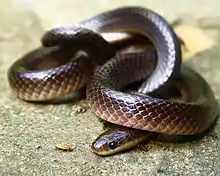Lesser black krait
The lesser black krait (Bungarus lividus) is a species of venomous elapid snake found in India, Bangladesh, and Nepal.[2][3][4] The specific epithet is after Latin lividus, meaning “bluish metal-colored” or “lead-colored”, referring to the snake's coloration.
| Lesser black krait | |
|---|---|
 | |
| Scientific classification | |
| Domain: | Eukaryota |
| Kingdom: | Animalia |
| Phylum: | Chordata |
| Class: | Reptilia |
| Order: | Squamata |
| Suborder: | Serpentes |
| Family: | Elapidae |
| Genus: | Bungarus |
| Species: | B. lividus |
| Binomial name | |
| Bungarus lividus Cantor, 1839 | |
Description
The Lesser black krait is a rather small sized snake. The body (dorsum) is smooth and black to bluish-black in colour. The upper lip is white. The ventrals are white with grey edges. The eyes are small, black with round pupils. Eyes are positioned more towards the snout. The scales are arranged in 15 dorsal rows (15:15:15). The mid-dorsal (vertebral) scales are only slightly enlarged than the other rows. Anal and subcaudal scales are undivided. 7 supralabials(3rd & 4th touches eye), 7 infralabials(3rd touches anterior genial); Temporals 1+2; Postocular 2.[5]
Distribution
India(North Bengal, Northeast India), Bangladesh, Nepal
Type locality: Assam, India
Ecology
Feeding
The krait is primarily ophiophagous, meaning it preys on other snakes.
References
- Limbu, K.P.; Ghosh, A.; Das, A.; Giri, V. (2022) [amended version of 2021 assessment]. "Bungarus lividus". IUCN Red List of Threatened Species. 2022: e.T127914543A219117279. doi:10.2305/IUCN.UK.2022-2.RLTS.T127914543A219117279.en. Retrieved 15 August 2023.
- Bungarus lividus at the Reptarium.cz Reptile Database. Accessed 14 July 2020.
- Harding, K.A.; Welch, K.R.G. (1980). Venomous Snakes of the World: A Checklist. Toxicon: Supplement. Pergamon Press. p. 8. ISBN 978-0-08-025495-1. Retrieved 9 June 2019.
- "Lesser Black Krait ( Bungarus lividus Cantor, 1839 )". indiansnakes.org. Retrieved 8 May 2019.
- Das, Abhijit 2018. Notes on Snakes of the Genus Bungarus (Serpentes: Elapidae) from Northeast India. in: C. Sivaperuman, K. Venkataraman (eds.), Indian Hotspots, Springer
Further reading
- Boulenger, G.A. 1890. The Fauna of British India, Including Ceylon and Burma. Reptilia and Batrachia. Taylor & Francis. London. xviii, 541 pp.
- Cantor, T.E. 1839. Spicilegium serpentium indicorum [parts 1 and 2]. Proc. Zool. Soc. London 7: 31–34, 49–55.
- Slowinski, J. B. 1994. A phylogenetic analysis of Bungarus (Elapidae) based on morphological characters. Journal of Herpetology 28(4):440-446.
